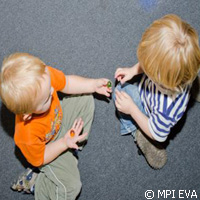Children, not chimps, share when they collaborate
Researchers in Germany and the United States have discovered that children as young as three years of age will share their toys equally with peers but only when they work together to obtain them. The study, led by the Max Planck Institute (MPI) for Evolutionary Anthropology in Germany, suggests that sharing in children is a collaborative phenomenon; in stark opposition, chimpanzees neither demonstrate this phenomenon nor does their behaviour hint at any collaborative connection. The findings are published in the journal Nature. Working with colleagues from Harvard University and Michigan State University in the United States, the German researchers say children who receive rewards as a bonus, and not for their cooperative nature, tend to keep most toys for themselves. The same is true if the children work next to each other but do not interact; the toys will not be shared. Studies have shown that adult humans generate the majority of their resources when they work together with peers. Not only do adult humans make the effort to share based on the norms of fairness, but also in terms of equity. Children, on the other hand, have a more selfish nature. But this latest study provides insight into how children as young as three consider whether or not rewards are produced collaboratively, which in turn impacts whether they will share their toys with their peers. The team paired the children that participated in the study, aged between two and three years. They were asked to manipulate an apparatus in order to obtain toys (marbles). In the first part of the study, the children were told to pull two ends of a rope at the same time so as to make a board with the marbles move towards them. After completing the movement, the children could get the toys. But one child obtained three and the other only one. The researchers compared this to a windfall situation with no collaborative rope-pulling but the same distribution of toys. In the second and third parts of the study, the researchers put the children in a collaborative, a windfall or a parallel work condition. The parallel work condition group had to produce an equal amount of work. The team had every child pull their own rope independently of the other children. They found that for all three parts, the three-year-olds, and even some two-year-olds, shared their toys only after a collaboration. No sharing was observed when individual work or no work was performed. 'The ontogenetically first sense of distributive justice may be that participation in a collaborative effort demands an equal division of spoils,' explains lead author and PhD student Katharina Hamann from the Department of Developmental and Comparative Psychology at the MPI for Evolutionary Anthropology. The team says that the probability of chimpanzees sharing, even if a collaborative effort is made, is highly unlikely. They point out that in the wild, chimpanzees rarely actively work together when it comes to subsistence. So they may have not evolved a tendency to distribute resources more equally when those resources are generated by a collaborative effort, they speculate. Concludes Ms Hamann: 'Taken together, the primordial situation for human sharing of resources may be that which follows cooperative activities such as collaborative foraging, when multiple individuals must share the spoils of their joint efforts.'For more information, please visit: MPI for Evolutionary Anthropology: http://www.eva.mpg.de/english/index.htm(opens in new window) Nature: http://www.nature.com/(opens in new window)
Countries
Germany, United States



